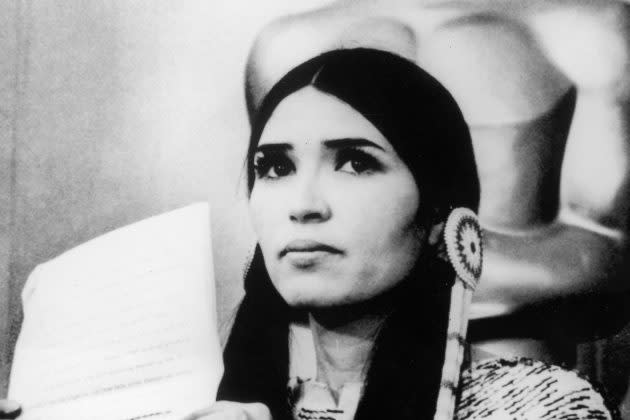
When Marlon Brando was named best actor for his performance as Vito Corleone in Francis Ford Coppola’s best picture winner “The Godfather” (1972), a 26-year-old Sacheen Littlefeather (Apache/Yaqui/AZ) took the stage to decline the prize on behalf of the actor. She was lambasted with an avalanche of boos from the audience, racist gestures such as “tomahawk chops” and threatened with violence offstage.
Fifty years later, the Academy Museum of Motion Pictures is apologizing for the treatment she received that evening, in addition to holding a special program and conversation titled “An Evening with Sacheen Littlefeather” on Sept. 17.
More from Variety
Now 75, Littlefeather, who is programming with Amy Homma, VP of education and public engagement at the Academy Museum, will offer a reflection aimed at healing.
Littlefeather became the first Native woman to stand on the stage at any Academy Awards ceremony back in 1973. The famous 60-second speech is featured in the Academy museum’s Academy Awards History gallery, echoing in the room with other historic moments such as Halle Berry becoming the first Black best actress winner and “Parasite” winning best picture. Her words brought attention to the 1973 Wounded Knee protest in South Dakota and resulted in her being professionally boycotted, attacked, harassed and discriminated against for the last 50 years.
“We are delighted and humbled that Sacheen has so generously chosen to engage with the museum and Academy to reflect upon her trying experience at the 1973 Academy Awards,” said Jacqueline Stewart, director and president of the Academy Museum. “Our thanks go out to Bird Runningwater and Heather Rae for helping us foster our cherished relationship with Sacheen.”
At the event, the Academy will read the apology letter that former president David Rubin sent in June. Following is a copy of the letter:
STATEMENT OF RECONCILIATION
June 18, 2022
Dear Sacheen Littlefeather,
I write to you today a letter that has been a long time coming on behalf of the Academy of Motion Picture Arts and Sciences, with humble acknowledgment of your experience at the 45th Academy Awards.
As you stood on the Oscars stage in 1973 to not accept the Oscar on behalf of Marlon Brando, in recognition of the misrepresentation and mistreatment of Native American people by the film industry, you made a powerful statement that continues to remind us of the necessity of respect and the importance of human dignity.
The abuse you endured because of this statement was unwarranted and unjustified. The emotional burden you have lived through and the cost to your own career in our industry are irreparable. For too long the courage you showed has been unacknowledged. For this, we offer both our deepest apologies and our sincere admiration.
We cannot realize the Academy’s mission to “inspire imagination and connect the world through cinema” without a commitment to facilitating the broadest representation and inclusion reflective of our diverse global population.
Today, nearly 50 years later, and with the guidance of the Academy’s Indigenous Alliance, we are firm in our commitment to ensuring indigenous voices—the original storytellers—are visible, respected contributors to the global film community. We are dedicated to fostering a more inclusive, respectful industry that leverages a balance of art and activism to be a driving force for progress.
We hope you receive this letter in the spirit of reconciliation and as recognition of your essential role in our journey as an organization. You are forever respectfully engrained in our history.
With warmest regards,
David Rubin
President, Academy of Motion Picture Arts and Sciences
Best of Variety
Sign up for Variety’s Newsletter. For the latest news, follow us on Facebook, Twitter, and Instagram.




